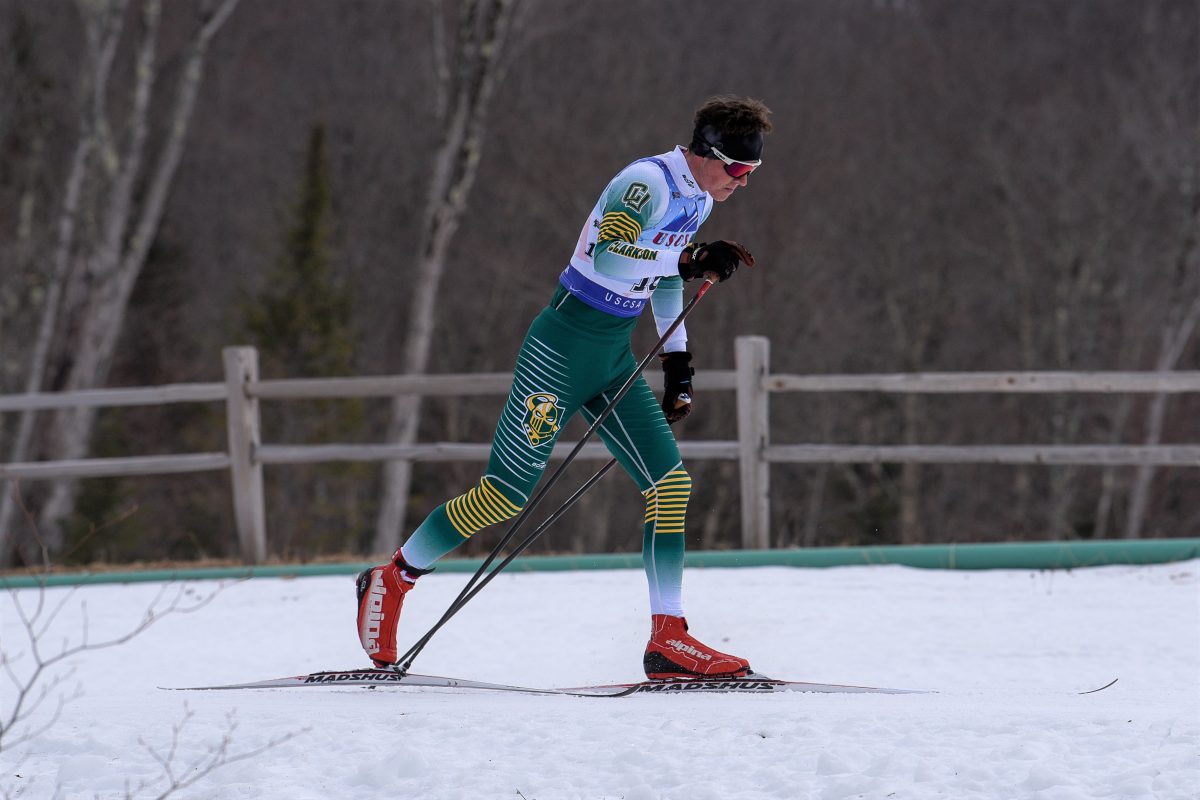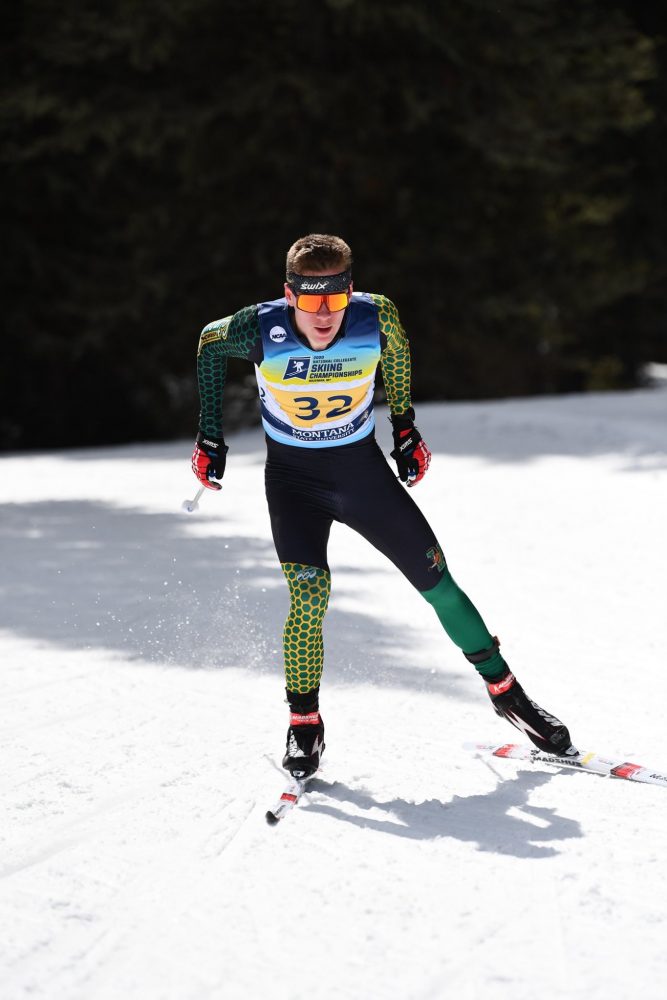“Fast and Female is the beginning of a revolution. In 2005, riding high on Canadian World Cup fever and Olympic dreams, the women of Canada’s National Cross Country Ski Team were inspired to share their enthusiasm with the next generation Canadian female cross- country skiers. Designed to get more girls skiing, as well as make a difference in the state of fitness among today’s kids, the inaugural event was a tremendous success.” – www.fastandfemale.com
Since then, the organization has grown dramatically. 2006 Olympic Gold Medalist and “Fast and Female” founder Chandra Crawford took time out of her busy schedule to answer questions about the organization and women in sport in general.
FasterSkier: What was the original impetus for the first Fast and Female event?
Chandra Crawford: I noticed that I was meeting so few girls on the teams from all over Canada. The goal of the first event was to “Inspire and be inspired†by connecting with the next generation of skiers. My teammates and I wanted to share our passion for the sport and get the up-and-comers all fired up.
FS: How has the organization evolved since that first event, and what are your plans looking forward?
CC: The first event was held in Silverstar in 2005, with a budget of $1,000. The very next year it had grown to a much larger event held in Canmore with national media coverage, a website, an employee (Magi Scallion) and $30,000 raised in sponsorship. For now the goal is to build on the impact we are having with these incredibly fun, free, one-day events.
New this year we’ve partnered with the Cross-Country Canada Women’s Committee to offer seminars for coaches and parents with gender-effective coaching tips.
In the coming years the expansions involve becoming a multi-sport organization (adding running and mountain biking), hosting a fundraising running race in Calgary, implementing a Fast and Female Certification Program for clubs, creating a magazine, and eventually becoming a nation wide fitness program for kids of both genders by infiltrating the school system.
FS: What are your thoughts on the discrepancy in numbers between males and females in cross-country skiing? Do you see these issues as specific to skiing, or are they consistent throughout sport?
CC: This discrepancy in number is what first motivated us to take action. It’s a general attitude towards sport among girls and society in general — that this is something the boys do. There has been incredible progress made — with women’s sport growing all the time, but also a long way to go when you see groups of girls standing around talking at recess instead of participating in active games. We need to get to the point where it’s much cooler to mess up your hair playing sports than to stand around trying to look perfect.
FS: Gender discrepancy in skiing is certainly not limited to Canada. It is also a major issue in the US, and looking at World Cup results, in Europe as well. What factors play into this, and do you think there is an inherent difference between men and women that will always result in more men being involved in the sport?
CC: All I can say is the power of sport to do good in society is tremendous, and the potential for impact is even greater with females who can be empowered in life by participating in sport. Maybe there will always be a discrepancy, but I don’t think there is any inherent difference between men and women that can limit the potential of a movement like this.
Providing sport opportunities for young girls will enable them to unleash inner strength and health that will serve them in every aspect of their lives.
A favorite quote of mine:
“A woman is like a tea bag. You never know how strong she is until she gets into hot water†— Eleanor Roosevelt
FS: The theme of this year’s biannual coaches conference, put on by the US Ski Team, is “Coaching Female XC Skiers.†What role do coaches play in the current gender discrepancy, and what types of additional knowledge do they need to excel as a coach of female athletes?
CC: There is a need to better equip the coaches (who are basically 99.9% male) with some gender-effective coaching strategies. Fast and Female plans to have a program to bring the advice of experts in the fields of psychology, nutrition, and physiology into everyday coaching. This program is well supported by the Cross-Country Canada Women’s Committee who are already doing some great work in this area for coaches and parents.
Sport psychologist Cal Botterill stated, “To harness the emotional energy in athletes is to tap into what is by far the most powerful psychological reserve we posses.†Based on this it really pisses me off when girls are perceived as being too emotional and therefore not tough enough.
I’d also like to see coaches feeling prepared to react better to the serious issues like depression and disorders of anxiety or eating by calling in professional help immediately, rather than ignoring them because they don’t know how to deal with them. The info we’re working with will make them better coaches, period.
FS: Has Fast and Female been successful in encouraging and promoting women in cross-country skiing?
CC: The past two years we’ve measured success in the deluge of anecdotal evidence that motivates us to continue. Very rewarding stuff… Starting this year, we will be counting the number of girls buying race licenses and enrolled in ski programs before and after the inception of our program for a more tangible indicator that a difference is being made.
FS: How did your role in Fast and Female come to be?
CC: In 2005 I was doing most of the organizing and corresponding with the parents and coaches of the 50 girls who registered for the initial event by spotting the notice on the CCC site and emailing me directly.
After the Olympics, I was excited to use my raised profile for the cause I care about so much and the organization grew very fast.
FS: As an elite female athlete, do you find that you are treated differently, or face additional challenges compared to men at a similar level?
CC: Certainly not in Canada where equality is among the best in the world and our country tied with Germany for most medals won by women (17) at the 2006 games. Our only shortcoming at this point is that there aren’t very many up-and-comers nipping at the heels of the small elite group Canadian female skiers, and it’s something I’m working to change.
FS: Who were your female role models growing up? Who provides you with inspiration today?
CC: Beckie Scott, Sara Renner, Milaine Theriault, Amanda and Jamie Fortier (Ed. Top women on the Canadian National Team within the last ten years) did so much for cross-country skiing in Canada and so much to motivate me personally. My journey is just a continuation of the breakthroughs they pioneered.
I was so fortunate to be growing up in Canmore where the national team was based and get to see these fast and fun women all the time. With their 2001 calendar “Nordic Nudes†they challenged the world to aspire to a healthy, fit body rather than a stick figure in a magazine. They have got the priorities in life dialed and continue to guide me.
But the more years I spend in this sport (so far a solid 7 since high school), the more absolutely amazing young skiers I meet. Nothing fires me up more than going out and sharing the pure love of the sport and movement with a pack of chicks (preferably in matching outfits).
FS: Have you discussed the issues of women in skiing with competitors from other countries?
CC: Yes — and such discussions are how I know we’ve got it made in Canada in terms of equality. Some of my international ski friends are keen on the cause of getting the general public to be more physically active, so who knows where future collaborative efforts will take us? One thing I think would be fun/fundraising would be to have masters camps in Europe, but it will probably have to wait until I’m done racing myself.
FS: What recommendations do you have for clubs and teams that wish to attract more young women to the sport?
CC: Realize the power of the social bonding through sport. All my best friends are still girls I skied with as a teenager. Get everyone to bring a friend and allow for some time in workouts when they can just connect and enjoy the sport together. Also find a fun energetic female role model for them (think Shayla Swanson (Ed. Shayla is one of the fastest Canadian skiers not on the National Team. She lives in Bozeman, Montana, and anyone who has met her would certainly agree with Chandra — she is full of energy and enthusiasm!)) and get her out there once a week to pump them up and answer questions.
FS: What has been the best part of Fast and Female for you on a personal level?
CC: Celebrating the gift of an active lifestyle with others is complete joy for me.
Connecting with the ski community in any capacity is always fun for me. Creating a nation-wide fitness program has been a dream of mine for many years. At the moment I think female empowerment through sport is where it’s at, but the organization is nothing if not expanding.
Hearing back from moms that their daughter who was literally dragged to our ski day while complaining, “I hate skiing! You can’t make me go!†is now a goal-setting, sport-loving skier. Watching them bomb a downhill and seeing the surprise on their face when they discover courage they never knew they had is incredibly rewarding for me.
FS: Thanks so much Chandra! For more information on “Fast and Female,” please visit www.fastandfemale.com.
</font></center></p>
<p><center><img decoding=)



